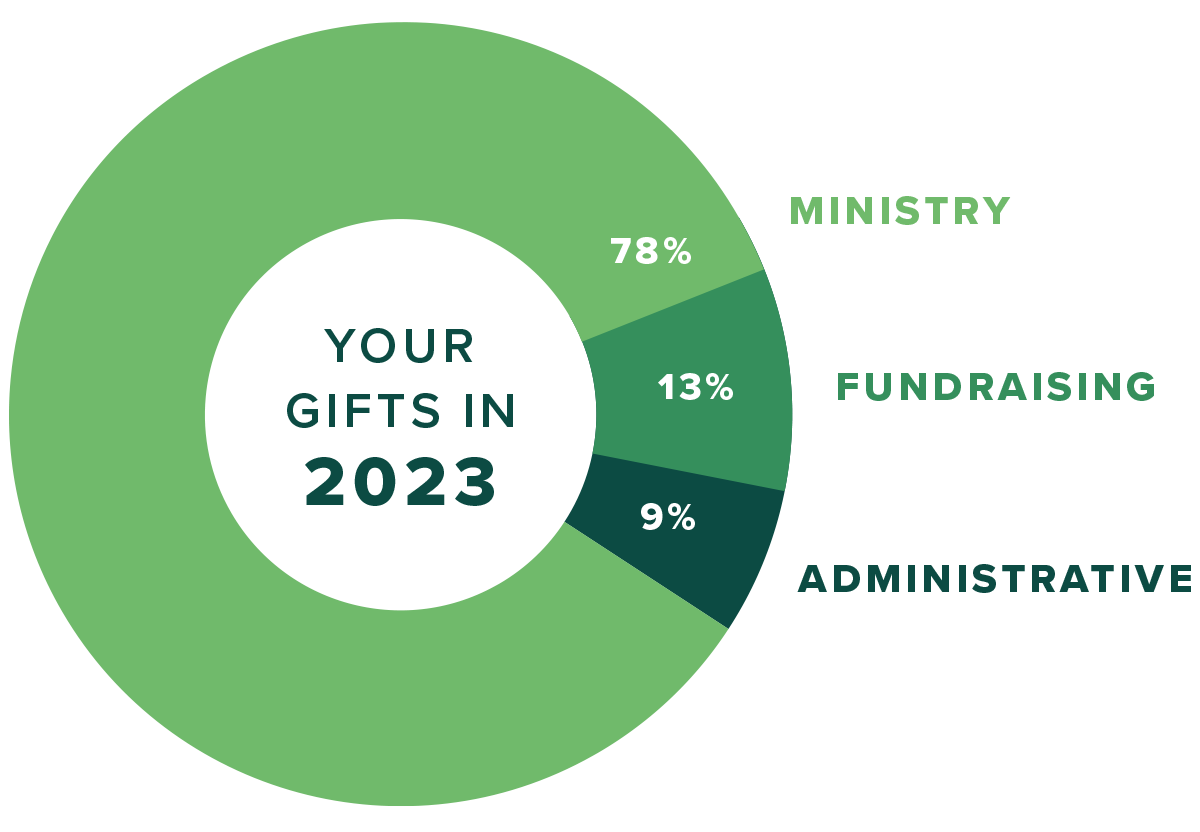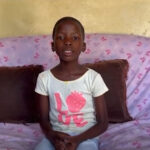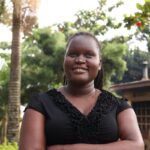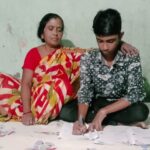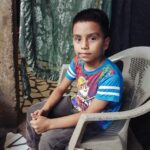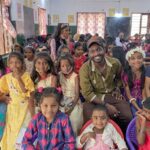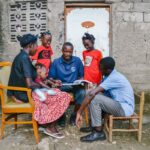Thanks to the teaching and self-affirmation Josephine receives at her Hope Center, she took a firm stand against a dangerous procedure that her extended family was pressuring her to have.
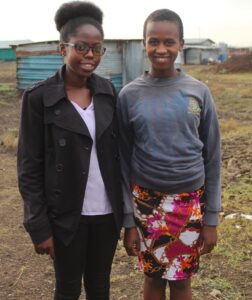
Josephine, right, with one of her Child Champions from the Hope Center.
“Always say no, with a straight face, to vices!”
This affirmation statement learned by Josephine at her Hope Center helped save her and her sister from losing their childhood and dignity to a once-customary procedure called female genital cutting (FGC).
FGC involves removing and damaging healthy female genital tissue and interferes with the natural functions of girls’ and women’s bodies, according to the World Health Organization. It is mostly carried out on girls from infancy to age 15.
In recent years, however, the government of Kenya has outlawed FGC and has tried to stop the vice in communities that practice it.
Despite the efforts and measures the government has in place to end FGC, some people still secretly conduct the procedure.
The process to curb the vice in Kenya was also slowed by the COVID-19 pandemic that had the country in lockdown for most of 2020 and 2021. UNICEF reported that in 2021, the number of FGC procedures increased in Kenya.
Shocking, Unwelcome News
Josephine, 13, is the firstborn of five children. She lives with her mother, her siblings, and their grandmother in a poor community in Syokimau, just south of Nairobi, Kenya’s capital. Her home is about a mile from PEFA Syokimau Hope Center.
One evening in April 2021 as Josephine was preparing dinner for her family, her mother asked to speak to her about something that she had gotten wind of.
Josephine’s grandmother, who had traveled from a village in Kajiado, had been sent to deliver news of the plan that their extended family had in place.
“My mother told me that my grandfather had instructed my grandmother to tell my parents to prepare my sister and I for FGC, and that we and other girls were to travel to the village for the activity to take place,” Josephine recalls.
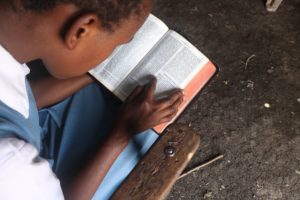
Josephine studies her Bible often.
“I was shocked! I was tight-lipped for some minutes,” she says, “I told my mother that my teachers at the Hope Center had told us that FGC was bad. I asked her if she was in support of the idea.”
Dorcas, her mother, did not support the idea.
“I was against it because despite being a Maasai woman, I never underwent FGC,” Dorcas says. “However, my in-laws were putting pressure and insisting that my two daughters undergo it.”
This is despite the government declaring FGC illegal. According to the World Health Organization, FGM can cause severe bleeding and problems urinating, and later cysts, infections, as well as complications in childbirth and increased risk of newborn deaths.
Remembering to Say ‘No’
As Josephine pondered what awaited her and her sister, she wondered if she could get help from her Hope Center. During that time, however, some counties in Kenya were still in lockdown due to the pandemic so kids were not allowed to attend the program at the Hope Center.
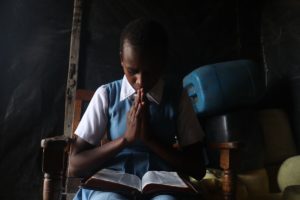
When she learned of her extended family’s plans for her Josephine prayed for an intervention.
Josephine says her only consolation was reading the Bible and praying for a miracle to happen.
“After receiving the news of the planned FGC, the days after were dark for me. I wished I knew where my teachers lived because I would have gone to share with them the issue,” she recalls.
She then remembered something her teacher emphasized during guidance and counseling sessions at the Hope Center.
“Teacher Joan always tells us to courageously say ‘no’ to vices at home, at school, or in the community,” Josephine says. “She encourages us to be firm when saying no and to never be silent about things we are not comfortable with.”
Josephine then told her mother and grandmother that she was against undergoing FGC and that she would report them to the Hope Center and to the local chief if they forced her or her sister to undergo the procedure.
“Josephine said she wouldn’t be traveling to the village for FGC, and I was in support of her opinion,” says Dorcas. “So, I talked to my husband, who then conveyed the message to my father-in-law back in the village.”
Teacher Warned Her of Risks
Despite letting her mother know of her stand against FGC, Josephine says she would at times have second thoughts about the decision.
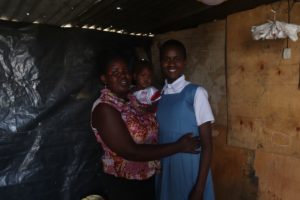
Josephine, her mother Dorcas, and her little sister in their house in Syokimau.
“When alone, I would wonder if it was wise of me to be against this societal vice,” she says. “I tried sharing with some of my friends and those from my tribal community urged me to go ahead with it, but those that are from other tribal communities were against FGC.”
Josephine says she learned of the risks that come with FGC from her teacher at the Hope Center. She also says that she has witnessed FGC rob girls in her community of their childhood.
“I have seen how girls’ behavior changes after undergoing FGC. They become rude toward their mothers, they treat all the uncircumcised girls with contempt, and they also drop out of school because they consider themselves adults despite being very young,” she says.
Her greatest fear was dropping out of school and being married off.
“I want to be a lawyer,” Josephine says. “My Child Champion told me I can be a lawyer if I focus on my education. I want to defend and protect the rights of girls and all children when I become a lawyer, and not even FGC was going to stand in my way.”
Child Champions Step In
Her decision not to undergo FGC did not go well with their extended family.
Josephine’s mother says her father-in-law was infuriated by their decision to listen to and honor their daughter’s wishes despite her arguing that the act is not socially acceptable in Kenya anymore.
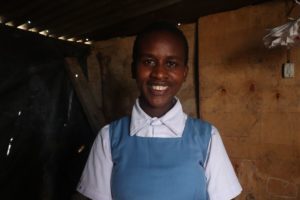
Since the FGC incident was averted, Josephine has been vocal about the procedure in her school and neighborhood.
“He threatened to curse us and disown us. He is from a generation that initiated kids into adulthood through circumcision and failed to understand why we were falling for campaigns against FGC,” Dorcas says.
As they struggled to convince their extended family to drop the matter, Child Champions from the Hope Center who were visiting kids at home happened to visit Josephine’s home.
Since the kids had not been allowed to visit the Hope Center due to the lockdown, the Hope Centers organized home-based programming where Child Champions would visit kids at their homes to listen, encourage, motivate, and also teach them.
When they visited Josephine’s family, she opened up to them about the plans to have her and her sister taken through FGC. At this point the Child Champions took up the matter and talked to the parents, who in turn talked their extended family out of it.
“On that day, God performed a miracle,” Josephine says. “I wasn’t expecting my Child Champions to visit us at home, but when they did, I knew God had answered my prayer. I had asked God to help intervene and His timing was perfect.”
Doing the Right Thing
Josephine’s mother says her daughter’s assertiveness helped stall the process and finally led to it being stopped.
“I am so grateful for the Hope Center,” says Dorcas. “Among kids in my neighborhood, my daughter stands out, thanks to what the teachers at the Hope Center teach her. Were it not for her assertiveness, my extended family would have overpowered us, and the story today would be different.”
Kelvin, a Child Champion at PEFA Syokimau Hope Center says, “We are preparing people who will bring change to the community, and it all starts by instilling the right mindset while they are young. My greatest joy is to have our kids doing the right thing even when no one is watching, just like Josephine did.”
In addition to being assertive, Josephine is a humble and happy girl. She is the deputy captain of her school, and she also leads the environmental club and the Christian Union.
Since the incident happened in 2021, Josephine has been vocal about FGC in her school and neighborhood. She urges other girls to speak out against the vice.
Your Gift to the OneChild Partners Fund will help us reach more kids like Josephine and bring hope to hard places.
See how faith and an intervention by a Child Champion save a teen’s life in Kenya:
We are accountable to the children we serve AND to our donors.
Our accountability to our donors is one of our highest priorities. Our goal is to use the funds entrusted to us as wise stewards. To do this requires continued monitoring of our fund distribution. OneChild is also a member in good standing with the Evangelical Council for Financial Accountability (ECFA)
